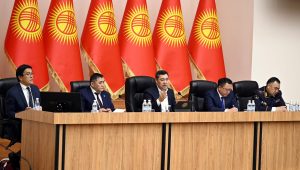On March 13, the Kyrgyz president’s press secretary announced in a Facebook post that the draft law “on mass media” had been withdrawn on behalf of President Sadyr Japarov.
Following a meeting last week with more than 40 representatives of Kyrgyzstan’s media sector, Japarov requested the bill be withdrawn and “finalized” – ostensibly to be re-worked and re-considered at a later time.
The law “on mass media” was developed by the presidential administration. Although the latest version was registered in the Jogorku Kenesh, the Kyrgyz parliament, in January 2024, the Japarov administration presented its first effort at “updating” Kyrgyzstan’s media regulations back in September 2022. It yielded almost immediate pushback.
The Adilet legal clinic, a Kyrgyz human rights organization, analyzed the initial draft law and concluded that there were “serious risks of improper and unacceptable derogations from human rights guarantees of freedom of expression.” The initial draft law, Adilet noted in October 2022, contained a number of problematic provisions, including a ban on the establishment of media by foreign individuals or entities. “In the long term, the document contains a high probability of isolating [the] information space of Kyrgyzstan from the outside world,” the legal clinic warned.
Adilet also noted vague wording in the draft law as “creating favorable conditions for the abuse of power by officials.”
In December 2022, the Japarov administration established a working group to finalize the law. The working group included several lawyers from Adilet, as well as the founders and top editors from several notable Kyrgyz media outlets, such as 24.kg, Kaktus.media, and PolitKlinika. According to contemporary reporting, the administration agreed to send a finalized draft of the law to the Venice Commission – an advisory body made up of independent experts on constitutional law and the impact on democracy – for an opinion.
The Kyrgyz government did indeed seek the Venice Commission’s opinion in May 2023. And the commission’s opinion was clear: “If the current version of the Draft Law is adopted, it could lead to violations of the rights to freedom of expression and have grave consequences for the media as the public watchdog in the country.”
Also in May 2023, the founder and chief editor of PolitKlinika – who was a member of the working group – was summoned by the State Committee for National Security (SCNS) for questioning about a recent article.
As 24.kg reported, in the working group’s six months only two meetings were held, and the draft was not finalized or agreed upon by the working group. Very little about the draft changed before it was submitted to parliament on January 9, 2024.
A week later, Kyrgyz authorities raided the offices of 24.kg, briefly detaining chief editors Anton Lymar and Makhinur Niyazova (Niyazova was also a member of the working group). The same day, 11 other journalists were detained, and at present eight remain in custody.
The draft law “on mass media” drew sharp criticism from inside and outside Kyrgyzstan, much like the “foreign representatives” bill. After it came under parliamentary consideration, a handful of MPs expressed concerns. Zhanar Akaev, for example, noted that the draft law was copied, almost entirely, from similar Russian legislation – a complaint also often aired about the “foreign representatives” bill.
Unlike the “foreign representatives” bill, which has passed two readings and awaits a third and final reading before heading the president for signature, the draft media law is headed back into the presidential administration for now.
As RFE/RL’s Kyrgyz Service has reported, the presidential administration believes that a new media law is necessary to establish “a balance between freedom of speech, pluralism of opinions and necessary restrictions.” Judging from the present crackdown on media in Kyrgyzstan – including a court order to shut down Kloop, one of the country’s most prominent investigative outlets, and the abovementioned detentions – there is a necessity to find a balance. But Japarov and the journalists have different ideas of what that balance looks like.
































